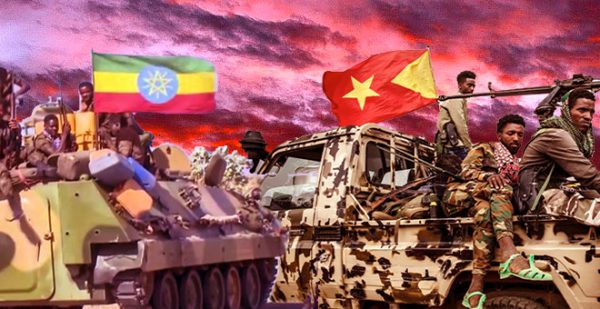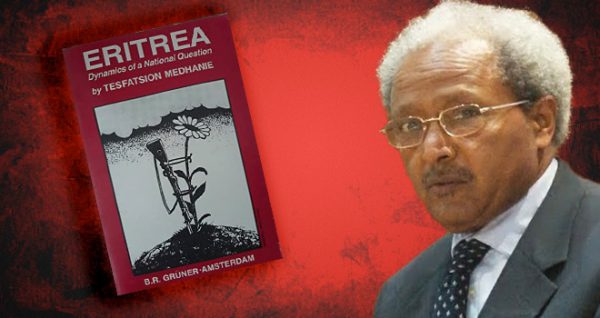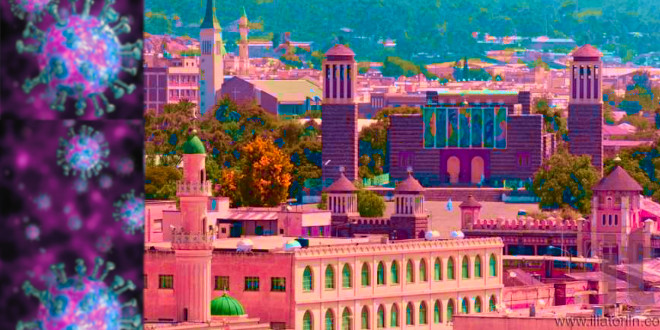Dilemma of the Decade: Betting On the Eritrean Opposition
“There is no such thing as a Good Opinion or A Bad Opinion if we stand for free speech”
We all have heard numerous times this triangle of hate kind of a story involving three players. The Eritrean regime, the opposition and the real or imagined “enemies” of the Eritrean regime ranging from the United States Government to Ethiopia. And the story goes as follows: (a) The Eritrean regime has been asserting, for some years now, that the incumbent Ethiopian government’s grip to power will come to end any time soon, (b) The regime’s “enemies” including the Eritrean opposition claim that Mr. Isayas’s government is on life support and in an political ICU due to a progressively worsening economic and political crisis, © To this, the Eritrean regime reacts by saying that the fall of the regime is the wish full thinking of its “sworn” enemies including that of the opposition parties who count to naught because they are only engaged in political “Hashewiye” or Alice in the Wonderland kind of political adventures.
Well! Well! If what each of these three major players are saying of one another are true, we would stand to witness the phasing out of at least one of them from the political playing field which in turn would probably provide a partial solution to the political crisis at hand. Unfortunately the story has more into it than begets the eye. The Ethiopian ruling party has solidified its power by a landslide victory in its 2010 national election, the regime of Mr. Isayas is trying to resuscitate from an apparent economic and political meltdown by tapping on hopes of a newly found bounty of mineral fortune, and the opposition seems to be slowly changing from a Hashewiye pitch to a “seemingly” more deliberate and productive tone. Each player seems to be solidly entrenched in its own designs without necessarily trying to reach out for the other to bring a compromised political solution for either the Ethio-Eritrean border stalemate or the end of dictatorship and human misery in Eritrea.
The above scenario has made betting on the Eritrean opposition a dilemma especially for Eritrean Christian Highlanders. The opposition’s bid for power will probably hit more brick walls of its own making than anticipated. And the venture of unseating Mr. Isayas from power will be all the more difficult in view of the persistent and targeted propaganda onslaught on Christian Highlanders by some elements in the opposition camp. Consequentially, the impetus for giving Isayas more breathing time is coming from none other than the opposition camp itself. In other words, grabbing power from wedi Afom is not going to be an easy scoop for the opposition given the fact that the opposition has a lot of problems of its own to sort out, the major issues being its failure to strike a balance between the often contradictory and clashing interests and visions of the strange bed fellows that make up the consortium of political parties under the umbrella of the ENA (Eritrean National Alliance) and the under representation of Eritrean Highland Christians in the leadership of the opposition camp.
The political fireworks have changed in contemporary Eritrea from that of the 1950‘s. But many pundits from the ENA are trying very hard to model their political agenda after the party programs of the 1950’s . This rendition bears no fruit because it amounts to clocking political thought as far back to the past than is reasonability desirable or viable. The challenge we are facing today is mainly how to overcome the barriers that are frustrating our hopes and aspirations from reaping the fruits of our national independence. No amount of historical nostalgia of the 1950‘, nor a preponderance of fundamentalist flourishes and endless opposition foot dragging will help us a bit in our struggle for liberty. The willful and deliberate abuse of power being exercised by the incumbent regime, which has exposed our people to inexplicable human rights and socio- economic deprivation, is at our front yard and we need to do something about it. In view of this, the million dollar question of the day is , can we bet on the opposition camp for to the liberation of our people from the ongoing socio-economic crisis in Eritrea?
The degree of the dilemma of betting on the opposition could vary depending on who is doing the betting. But considering the political behavior of some political parties under the ENA umbrella, and considering the unrepresentative composition of the top brass of the ENA, it is my considerate opinion that it is not at all surprising to see many Eritrean Christian Highlanders having a second opinion about the intentions and viability of the ENA. To many Christian Highlanders, rallying behind the ENA in prejudice to the Eritrean regime is a hard pill to swallow or at best an issue involving choosing from the lesser of two evils. To many Christian Highlanders the opposition camp is proving itself to be an unknown quantity. And this feeling seems to be aggravated by the preponderance of divisive and hatemongering literature that is irresponsibly being disseminated by some political actors and websites sympathetic to the EDA.
At times the hyperactivity of radical religious elements in opposition websites poses as an agonizing reminder of why the Eritrean Christian Highlanders were more in favor of Union with Ethiopia than their Moslem counterparts several decades ago.. In the 1950’s the politics of fear and suspicion, foddered by Ethiopia’s sinister maneuvers to annex Eritrea, probably triggered the political indiscretion or blunder made by main stream Eritrean society which many statesmen of that generation lived to regret.. The synergy of all these is that many Christian Highlanders may still be looking for a better alternative strategy of struggle to unseat the incumbent regime and install a democratic government than what is being offered by the ENA. The intensity of religious and sectarian rhetoric emanating from some players in the opposition camp is casting some doubts on many Christian Highlanders as to the viability of building a secular system of governance by partnering with their Lowland Moslem brothers.
Some vocal people in the opposition have unabashedly been calling Eritrean Christian Highlanders land grabbers, enablers of the cruel regime and much more names. We have seen many Muslim writers approaching Eritrean political issues as a tug of war between the Highlander and the Lowlander or between Christians and the Moslems. It looks like some radical elements embraced by the EDA cannot go out of this dichotomous vicious cycle of political parody. This has probably turned off many Eritrean Christian Highlanders and got them into thinking that the opposition camp does not uphold their interest and that the only way forward for them is to build their own safety net by continuing to be a formidable political and military force with the capacity to squash any threat to their security. To this end many Christian Highlanders think that reaching out for the Eritrean Defense Forces (traditionally predominately from Highland Eritrea) with the aim of purging the regime could be the most viable strategy to bring reform in Eritrea than anything the opposition offers.
We cannot also rule out the possibility that, given the uncertain and polarized nature of the opposition camp campaign, Eritrean Christian Highlanders may, as a last resort, want to give Isayas a second chance to reinvent himself and to abandon his dictatorial tendencies and yield to the mounting pressure for democratic transition, while still maintaining his traditional support base on the dominant Christian Highlanders population – a long held legacy of the EPLF which liberated the country in 1991. We are already witnessing Isayas softening his neck and begging to reconcile with Djibouti. With a little more arm twisting, who knows he may yield to democratic governance too. It would be a win-win situation for Isayas to reinvent himself and rectify all the excesses and human rights abuses that his government is being accused of on a daily basis. This may be a paradigm shift for a cruel and sworn-in dictator to do but the opportunity is still out there for him to soften his iron grip and let the Eritrean people choose their own government through a democratic process without any further bloodshed.
In conclusion, I think it is reasonable to assume that Eritrean Christian Highlanders would not bet on the opposition camp for a redemption from the dictatorial government. It is more likely that they would rather strive to reinvent the EPLF to form a secular and populist government and secure majority rule in Eritrea through democratic election. Moges Tekeste was trying to tell us that democracy and “rule of law” are two different things. However, contrary to what he said, democracy is the dictatorship of the majority. Majority votes are used to pass laws and even amend constitutions. Majority rule (democracy) and rule of law are inseparable. And since the Eritrean Christian Population has a clear majority over any other ethnic group it will play a crucial role in determining how the country will be governed. That’s why any political niche, like the so called “Eritrean Covenant”, will not fly off the ground without Eritrean Christian Population backing and approval. So, the betting will obviously be on a party that promotes a political formula that aims at the appeasement and accommodation of the interests of the majority and not on the diffused and often myopic vision of Eritrea dictated by so many anomalous notions such as flirting with the idea of establishing an Islamic State, enforcing Sharia Law, and establishing autonomous Kunama nation. These notions are something one cannot talk about in a “mixed crowd” as Semere Tesfai rightly put it. So, the best case scenario is for all Eritreans to create viable partnerships without letting their ethnic and religious differences coming between them and exerting a concerted effort to form a secular government that guarantees citizenship rights without discriminating on the basis of ethnicity, religion and core cultural beliefs. But if this cannot be achieved, it will all boil down to the survival of the fittest through a democratic process and majority rule. And the Christian Highland Population has an upper hand on all these.
The recent match between the English and U.S. national soccer teams in the knock out round of the world cup soccer series, ended with an unexpected outcome when Rob Green, the English goalie, made an unbelievable flub of letting the ball hit the net ending the game with a 1-1 draw. It appeared that “Green was kneeling down with his body behind the ball and appeared to be all set to make an easy scoop. His hands just didn’t cooperate”. This example was picked to draw a parallel to the political scene being staged by the Eritrean opposition camp. In the Eritrean political playing field there are many players (goalies) whose hands wouldn’t “cooperate”. The Eritrean opposition camp -which seems to strive for an easy scoop of political power- has on the contrary even failed to cause the slightest stir in establishing a solid support base especially within the mainstream Christian Highland population .




Awate Forum